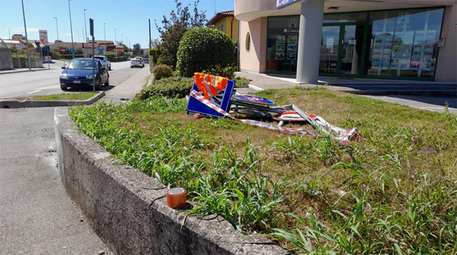(ANSA) - ROME, AUG 23 - A United States aircraftswoman who
knocked over and killed a 15-year-old boy in northern Italy at
the weekend must be tried in Italy and not the US, the boy's
mother said Tuesday.
The 20-year-old USAF solider was based at the Aviano air force
base near Pordenone.
The US usually tries its own citizens back in the States even if
they have committed crimes abroad.
A case in point was the Cermis cable car disaster near Aviano in
1998 in which the US pilots who flew too low and cut a cable
plunging 20 people to their deaths were acquitted of
manslaughter in the US, straining relations with Italy.
Another case was the 2005 shooting at a Baghdad checkpoint of an
Italian intelligence officer, Nicola Calpiari.
"That woman must be tried in Italy and serve her full term,"
said Barbara Scandella, mother of Giovanni Zanier, the victim of
the incident near Pordenone early on Sunday morning.
The aircraftswoman, 20-year-old Julia Bravo, was found to have a
blood alcohol level four times the legal limit in Italy.
She faces a hearing to uphold her arrest warrant later Tuesday.
The woman, who was driving back from a night out, reportedly
lost control of her car after a roundabout and hit Giovanni
Zanier on a cycle path at around two thirty in the morning.
Zanier's mother had told him to walk back from the bar he had
attended with two friends even though his home was several
kilometres away.
The two friends were unhurt in the crash.
Bravo has been arrested and placed under house arrest, charged
with vehicular homicide.
The local council at Porcia recently ordered street lights in
the spot to be turned off at two a.m., but police said the
accident would probably not have been averted even with the
lights on.
An eye witness who came out of the same disco as Bravo
reportedly told police Tuesday that "that woman was completely
drunk when she took the wheel. She couldn't even turn the
ignition on"," reported the Gazzettino newspaper.
Bravo drove off in a direction that was diametrically opposite
the Aviano base, the witness said.
Bravo on Tuesday said "I'm destroyed by sorrow, I apologize for
the pain I have caused."
She exercised her right to remain silent when questioned about
the incident, however.
Bravo had asked only to make a spontaneous statement to
apologize to Zanier's parents and his brother.
She was remanded in custody, under house arrest at the Aviano
base, with charges of vehicular homicide upheld.
As well as the Cermis disaster, Italo-US relations were also
strained by the accidental killing in Iraq by a US soldier of
intelligence officer Roberto Calipari in an incident at a
checkpoint along the Baghdad airport road on March 4, 2005.
He was the only soldier at the checkpoint to open fire
and he also injured Calipari's driver and fellow SISMI agent,
Andrea Carpani, and journalist Giuliana Sgrena.
An unprecedented joint enquiry by US and Italian
investigators into the incident failed to reach an agreed
conclusion.
The American members cleared the checkpoint soldiers of
all responsibility and refused to hand Lozano over for trial,
while the Italians blamed the US's organisation of the
checkpoint.
Calipari, a former policeman who rescued several Mafia
kidnap victims before joining intelligence agency SISMI two
years before his death, has become a national hero in Italy.
Over the Mt Cermis incident, Italy's supreme Court of
Cassation ruled in August 2000 that the Italian courts have no
jurisdiction in the civil suit filed against the US for its role
in the
disaster two years previously.
Twenty died on February 3, 1998 when a US Marine Corps
plane sliced through a mountain cableway in the Dolomites near
Trento, sending a gondola plunging to the ground and killing on
those board - all foreign skiers except for the Italian
operator.
The families of the Mount Cermis victims were awarded the
maximum indemnity by the Italian government, 3.8 billion lire
each for a total of 76 billion lire ($38 million). Under Nato
agreements, the US government had to pay 75% of the total.
A US military court acquitted the pilot and co-pilot of
responsibility, only sentencing them on minor charges.
An Italian parliamentary commission of inquiry into the case
concluded in February 2001 that the pilots had committed
''aggravated manslaughter''.
The head of the commission, Ermanno Iacobellis, said that
at the time of the tragedy, in February 1988, ''Italy and the
people of the Trentino region lived through a moment of
subjection to higher needs of Nato training.''
The panel spoke of ''a tragedy foretold'' because of
previous low-flying flights in the area.
The report was highly critical of the US military court
which acquitted the pilots, Capt. Richard Ashby and Capt. Joseph
Schweitzer, giving them only a dishonourable discharge because
they had tampered with evidence of the flight.
But it also pointed the finger at the Nato chain of command
in Italy which had in fact allowed low-level flights to become
routine. (ANSA).
US soldier who killed boy must be tried in Italy says mum (36)
Must serve full term here says Giovanni Zanier's mother
